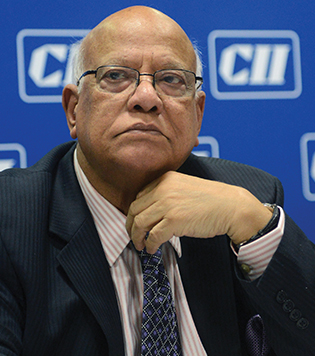Bangladesh finance minister looks to smaller, simpler sector
Bangladesh’s finance minister, Abul Maal Abdul Muhith, talks to Stefania Palma about the local banking sector, the current account deficit and government revenue, ahead of stepping down at the end of 2018, after a decade at the ministry.
Looking back at his nine years so far as finance minister, 84-year-old Abul Maal Abdul Muhith agrees with the general consensus that there are too many banks in Bangladesh – 57 in total – and says he encourages consolidation.
The pace of mergers and acquisitions, however, has been slow and Mr Muhith blames the country’s ineffective legal system. “Within the next couple of months, I want to present amendments to the banking law to promote mergers and [simplify] bankruptcy [proceedings],” says Mr Muhith.
Counterintuitively, however, he reversed the central bank’s decision to deny nine new bank licences back in 2013. What is more, he wants to grant another three licences in 2018. “The decision to [issue] banking licences is ultimately political. But we ensure that the people who are [setting up banks] are men of means,” says Mr Muhith.
Overbanking overlooked?
But what about the issue of overbanking? “I am not very worried because I think they will be forced to merge, [and] numbers will come down, perhaps in a couple of years,” says Mr Muhith.
The three new banks include one that Mr Muhith forgot to include back in 2013; one lender that missed the application deadline five years ago; and one bank backed by a notable individual who wants to set up a hospital in the Jessore district in honour of his wife, according to Mr Muhith.
Granting banking licences for political reasons into a crowded sector that has a non-performing loan problem and a history of fraud and bankruptcy is arguably risky. Farmers Bank, one of the nine set up in 2013, is facing a liquidity crisis after a run on deposits in late 2017.
In response, Mr Muhith announced that state-owned banks and the Investment Corporation of Bangladesh will buy a 60% stake in Farmers Bank. “I made it a condition that banks need to surrender their majority [shareholding if they are to receive state support]. [Farmers Bank] wanted the help [while keeping] majority shareholding,” he says.
A question of independence
Mr Muhith's deliberating on bank licences raises questions on the independence of the country’s central bank, Bangladesh Bank, and its effectiveness as a supervisory authority. But Mr Muhith says: “In the past nine years I have maybe given two or three instructions to the central bank. We function much more informally. I call the governor and speak to him.”
However, he adds that he was about to ask the central bank to withdraw a request for a defaulted borrower in the garments sector, Sydney Sweater, to make additional payments to its creditor, Southeast Bank. “After two or three years [of settling this case], Bangladesh Bank has put forward a demand for an additional amount... Sydney Sweater has closed its business... [Bangladesh Bank] is not allowed to issue an order because it did not react [quickly enough],” says Mr Muhith of the directive.
In the past nine years I have maybe given two or three instructions to the central bank. We function much more informally. I call the governor and speak to him
On a macroeconomic level, two indicators to watch are Bangladesh’s growing current account deficit and its dwindling government revenue. The country’s trade deficit almost doubled from $4.51bn in the period between July and December 2016 to $8.63bn in the same period in 2017. But the fact that import growth focused on capital machinery and intermediate goods “speaks well for the importance of industry. It means that more industrialisation [and] investment will be made and it means [there will] also be an increase in exports,” says Mr Muhith.
Bangladesh is also struggling with building up government revenue, which accounts for only about 10% of gross domestic product (GDP), one of the lowest ratios in Asia. A poor record of tax collection is part of the problem. “There is resistance against taxes. We are used to not paying,” says Mr Muhith. Only 32,000 out of 800,000 firms in the formal sector pay VAT in Bangladesh. Worse still, only 2.8 million people in a country of 160 million pay income tax.
Stepping down
Mr Muhith has announced he will step down at the end of 2018, an election year for Bangladesh. It is likely to signal the end of a political career that predates the 1971 war of independence with Pakistan. “I am quite happy with what I have been able to do. I inherited a budget of Tk920bn [$11bn] in 2009. I am setting a budget this year of Tk4600bn – an increase of more than 400%. When I was [finance and planning] minister in 1982, the budget was Tk340bn,” says the minister.
Bangladesh is still a long way from having a risk-free banking sector, an independent central bank and solid government revenue. But the progress the country has made since the 1970s, when it faced genocide, the independence war and the 1974 famine, shows that it is heading in the right direction.



